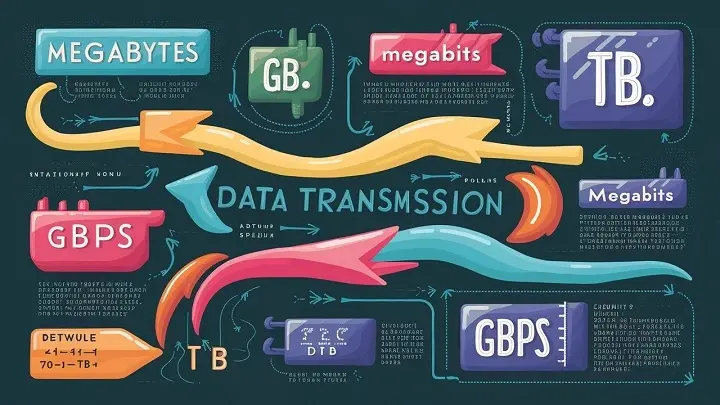Megabytes, Megabits, Gbps & TB: What you need to know

Familiar measuring units in the computing process and the linked Internet are usually MB, Mb, GB, Gb, TB, and more recently PB. Knowing those several terminologies can prove to be difficult. A simple and fundamental guide to how to evaluate some of the most often used data units will be provided in the following paper.
Megabytes vs Megabits
When it comes to storage, the one most important paradox everybody should keep in mind is that between bytes and bits. A byte is a little bit of data; eight bits in size or equivalent is eight bits.
A megabyte (MB) is 1,000,000 bytes since megabytes is a shortened form of "million bytes". One can gauge the capacity of a computer or the size of a given file using megabytes. A high-resolution picture, for example, might be as large as 5 MB while the hard disk capacity of your laptop could contain 500 GB.
One kilobit (kb) is equal to 1000 bits; one million bits, or 1,000,000 bits, is equivalent to a megabit (Mb). Megabits are used as a standard in computing and telecommunications to gauge internet connection speeds and or data transfer rates. For example, your home internet plan can call for service rated as "50 Mbps."
One should note here that bits are smaller units than bytes. Eight bits altogether make a byte. Regarding internet speeds, although it is Megabytes per second (Mb/s), Internet Service Providers usually announce the data rates in Megabits per second (Mb/s). This is so because it gives the figures more grandeur!
Gigabytes rather than gigabytes
The same is true for other measurements including one byte being different from one bit, gigabytes (GB) and gigabits (Gb), etc., or one Gb, is equal to 1000 MBs. 1,000,000,000 bytes or 1,000,000,000 KB. Regarding computer storage, one gigabyte may fit roughly 500 high-quality images or one hour of video.
In computer networking, Gigabit is a term used to describe one thousand megabits or one billion bits. Though both these words are used collectively in casual language, a "50 Gbps" internet connection is much better than a "50 Mbps".
TB, the terabytes
Terabytes (TB) start to be used as we climb in capacity and reach ever higher degrees of storage.
In the binary method of measurement, one terabyte is equivalent to 1000 gigabytes; in decimal notation, one trillion bytes. Most home computers nowadays have hard drives with hundreds of GBs and a few TB capacities. Enterprise business servers might have a capacity spanning thousands of TBs.
Here are some common storage capacities of regular computer files and devices to provide a sense of scale:
Processing a text document weighing about 0.5 MB is part of this chore.
MP3 song file with 5 MB file size.
High-definition image with up to 10 MB of size.
Up to three GB of one one-hour Netflix video
- 25 GB Blu-ray disk
500GB to 2TB external hard drive
Laptop hard drive: 256 GB – 1 TB.
Gaming console hard disk: 500 GB to 1 TB is the range.
Online Connection Rates
In terms of internet connection speeds, high numbers indicate quicker speeds and improved performance:
Old basic broadband ranges: from 5 to 20 Mbps.
Basic and regular connection: home broadband with 100 to 200 Mbps.
Internet connection, fiber-optic, gigabit 500–1000 Mbps (Gbps)
To review the vocabulary:
Megabytes (MB) = measurements of storage capacity; Megabits per second (MBps) = unit of internet speed; The description "Gigabytes (GB) larger than megabytes"
Gigabytes (Gb) is more than a megabit; massive storage capacity is involved. Terabytes (TB) is an even more massive measurement of storage capacity.
The next time your acquaintance boasts about their 500 Gbps ultra-fast fiber optic home internet connection, you can gently remind them that at most they mean 500 Mbps. But with gigabit networks emerging, the need to have those incredibly fast multi-gigabit speeds will become a reality.